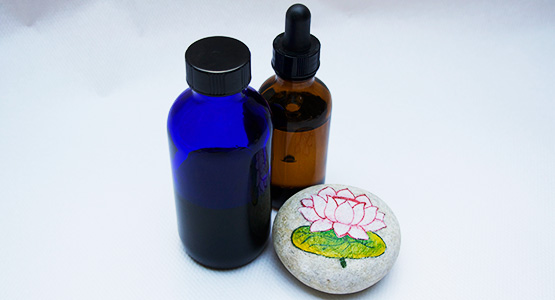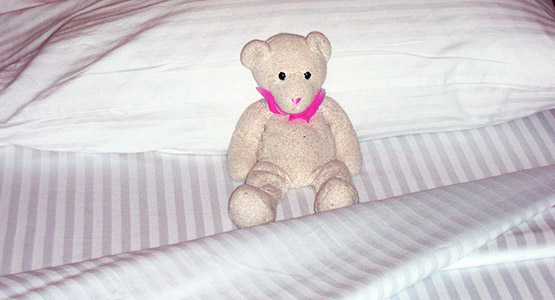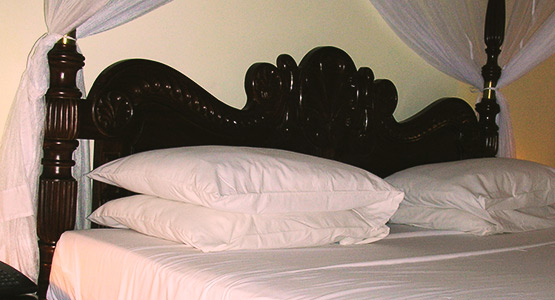Imagine this scenario. You are comfortably swaying in your seaside hammock. There is a gentle ocean breeze cooling your skin from the warm afternoon air. The sweet smell of orange blossoms drifts by, while the ocean waves sing a lullaby. Ahhh… a gentle nap is calling your name. Just think about how restful your sleep could be!
Unfortunately, if you are like most other people, you live in a hyper-stimulated, “always on” world. Throughout the course of a typical day, your senses are regularly bombarded. Bright device screens. Sound channeled through ear buds. Super-spicy snacks. Heavily perfumed co-workers. The list goes on… and on… and on.
Sensory Overload
Over-stimulation of the five senses can compromise your ability to get sound sleep.
With this in mind, it’s no wonder sleep deprivation is on the rise. The onset of the Information Age radically changed the way we work, communicate, consume entertainment and conduct the business of living. But the reality is that we are not hard-wired to be “wired.”
if you are like most other people, you live in a hyper-stimulated, “always on” world.
Ayurveda understands that finding the root cause of a problem is the first step toward re-gaining alignment. Explore the questions below. They might help you uncover what is keeping you from sleeping. We have also included a few tips to help you soothe your five senses before bedtime.
Sight
Melatonin is a hormone produced by your body that impacts your ability to sleep. Its production is tied to circadian rhythms. When the sun goes down (i.e. darkness occurs), your body releases melatonin into your blood stream. This triggers your body’s receptivity to sleep.
Rampant use of devices and electronics tops the list of things that short circuit your senses at night. Bright light directly inhibits the release of melatonin. Research has shown that the blue light of LED-backlit computer screens significantly suppresses melatonin production.
The connection between light and lack of sleep extends beyond your laptop. Do you flip on the T.V. as soon as you climb into bed? Do you read from a tablet, answer emails or catch up on social networking with your smart phone? What about other lights? Clocks, alarm systems, chargers and docks usually have visible power lights. These all emit LED light that can contribute to disturbing your natural rhythms just when your body needs to calm down.
Here are a few Ayurvedic suggestions for calming your sense of sight:
- Reduce light as much as possible in the bedroom. Get some light-proof curtains and cover all LED power lights (clocks, alarm system, stereo, etc.).
- Give yourself a break. Turn off your laptop, tablet and T.V. at least an hour before bed. Switch your smart phone to airplane mode and leave it in another room!
- Use eyeshades for sleep. It might sound hokey, but they will enable you to block stimulation.
Hearing
Ear buds and wireless headsets help you to multi-task and to “tune out.” It’s easy to forget that your ears need a break, too! Do you use the evenings to catch up on phone calls with family and friends? How much time do you spend on the line? Is the stereo or T.V. always running in the background? It might help you distance your mind from the day, but it is revving-up your senses at the same time.
Here are a few Ayurvedic suggestions for calming your sense of hearing:
- Limit late night conversations on the phone.
- Dial down the music. Take the earbuds out. Enjoy the silence! Start “unplugging” an hour or two before bedtime.
- Take an evening walk outside. Leave your devices at home and just listen to the quiet sounds of the evening. The rhythm of your steps on the ground. Crickets chirping in the summer, leaves rustling in autumn or snow crunching in the winter are all soothing sounds for your auditory sense. Make this an important part of your daily routine.
- Put a few drops of oil in your ears at night, secured with a cotton ball. This calms the ear nerves and muffles any sound. Try organic, cold-pressed sunflower oil. You will be shocked at how soothing this can be.
- If you do like to “power-down” with a little sound in the background, listen to 15 minutes of nature sounds, such a rain melody, birds quietly chirping or streams flowing, before going to bed.
Touch
It’s hard to imagine overloading your sense of touch, unless your work is very tactile. But it happens. Rough clothing materials or starched shirts can aggravate your skin. So can your daily routine. Shower gels, deodorant, laundry detergent additives, make-up filled with chemicals and a host of other products introduce unwelcomed toxins that interact with your nervous system.
Here are a few Ayurvedic suggestions for calming your sense of touch:
- Bring softness into your world. Invest in some natural fabric sheets and pajamas.
- Give yourself a full-body oil massage right before bedtime. It is incredibly relaxing.
(Note: Abhyanga, or a self-oil-massage, is a well-known Ayurvedic practice. It is a recommended part of your daily morning routine and has numerous health benefits. An oil massage at night is a modified—and greatly simplified—version of this.) - Take a baking soda bath before bed. Place a cup of baking soda in warm bath water. Relax!
- Before you retire to bed, put a dime-size drop of coconut oil on your head (center of your scalp) and message it in. Massage your feet for a few minutes with sesame oil (if you run cold) and coconut oil (if you run warm). Be sure to put on some cotton socks to avoid ruining your sheets!
Smell
These days, everything seems to have a scent. How many products do you use that are artificially scented? Read the label on your various lotions, perfumes and beauty products. They are generally scented with man-made ingredients that wreak havoc on your senses. And don’t forget to look around your house. Air fresheners, detergents, fabric softeners and scented candles can all contribute to your sensory overload.
Here are a few Ayurvedic suggestions for calming your sense of smell:
- Go natural for a week. Hide or unplug the air fresheners. Leave the perfume behind.
- Leverage aromatherapy. Certain scents have the ability to relax your nervous system and induce sleep. Place a few drops of Slumbertime aroma oil in an aromatherapy diffuser. You could also use any of the following essential oils: lavender, sweet orange, jasmine or chamomile.
- Leave the fabric softener in the box. Try ½ cup of white vinegar in your wash rinse cycle. It has a similar effect without introducing toxins. It has a significantly lower price-tag, too!
Taste
Closely connected to smell, your sense of taste is frequently engaged throughout the day. So what is in your diet? Foods impact your ability to sleep in several ways. Do you consume processed foods? Some artificial flavorings and colorings have been known to encourage hyperactivity, especially in children. Also, does everything you eat agree with you? Extra spicy foods are known to cause indigestion, which always foils a good night’s sleep.
Here are a few Ayurvedic suggestions for calming your sense of taste:
- Eat a diet rich in whole foods. If this seems like an overwhelming task, just start by eliminating food additives—such as sodium benzoate, MSG or certain yellow and red dyes—for a week or two. There is some evidence that these are linked to hyperactivity.
- When it comes to getting a good night’s sleep, timing of meals may be more important than what you are actually consuming. Allow at least three hours between your last bite of the day and your head hitting the pillow. If your digestive system is active (i.e. you have eaten within 3 hour of bedtime), your ability to get to sleep could be compromised.
A calm body and a calm mind lead to a good night’s sleep. Now, more than ever before, your ability to counter balance all of the stimuli you to which you are exposed during the day is critical for ensuring healthy sleep habits.





